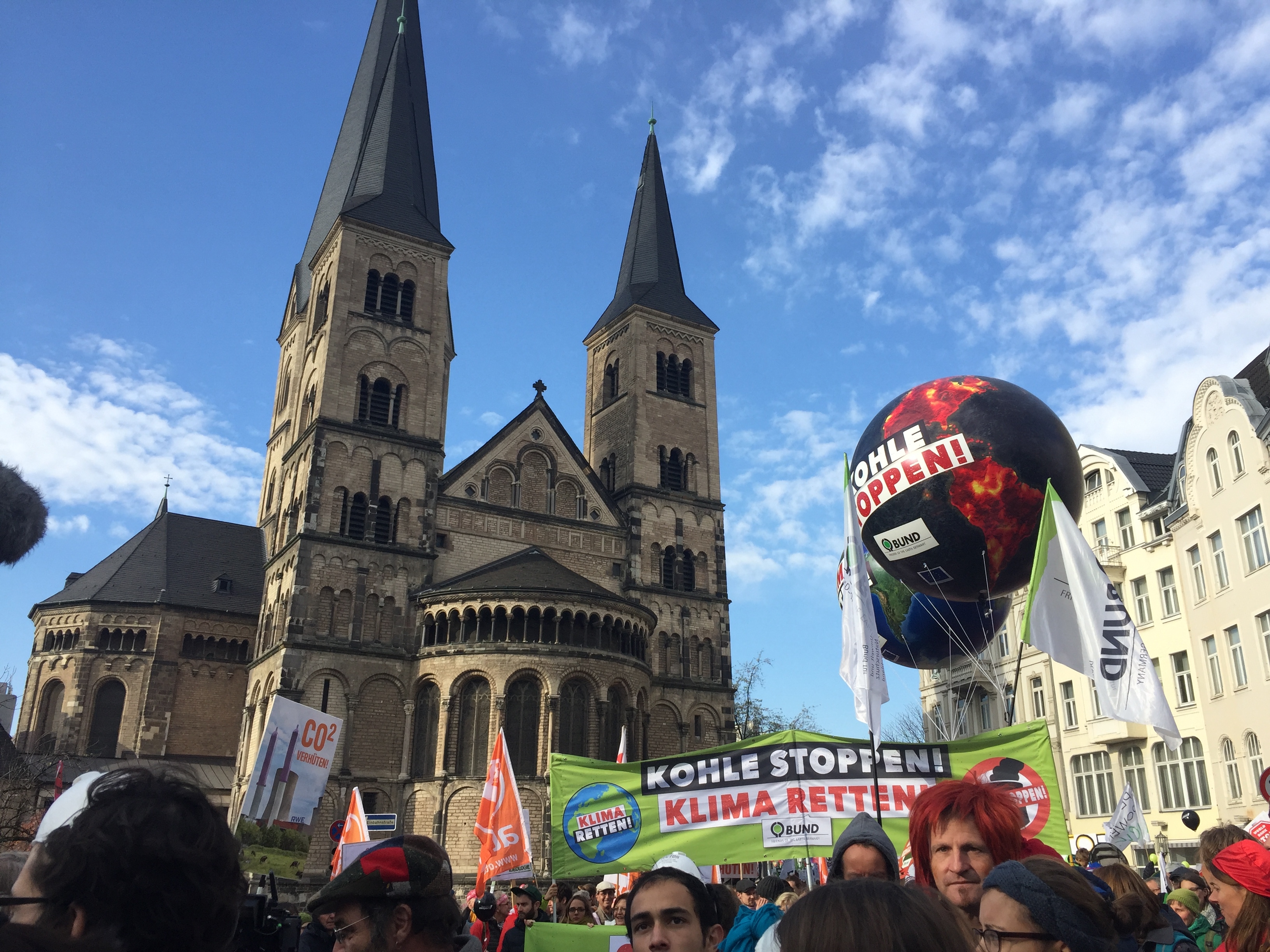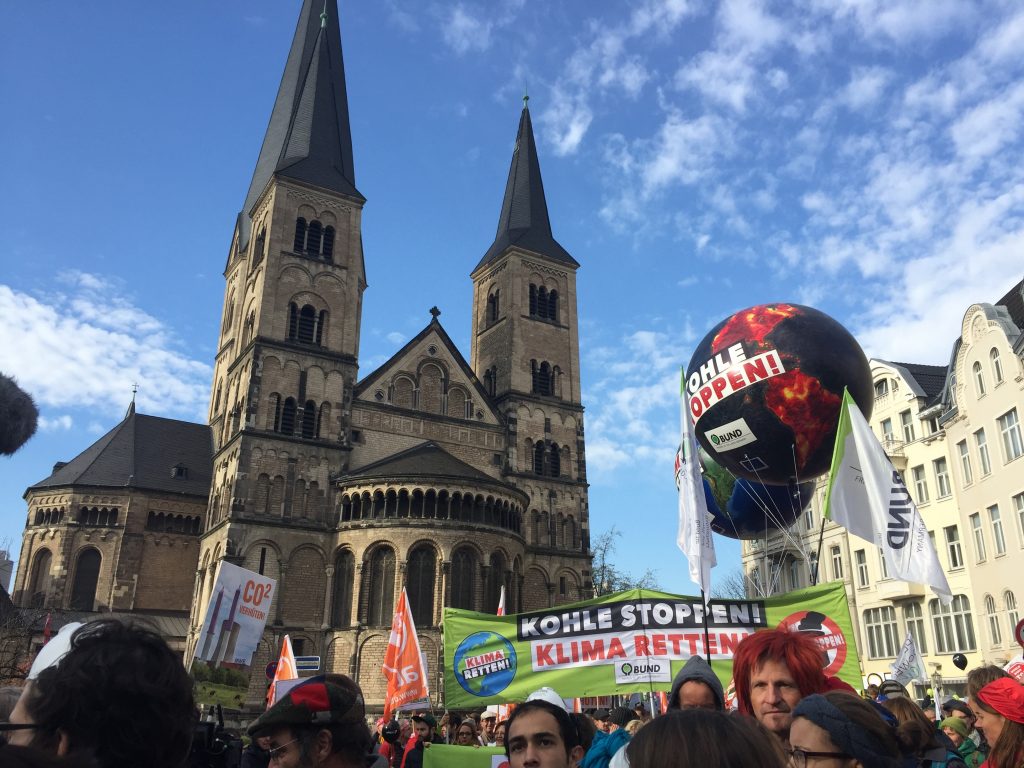
Over the past week, the staff present at COP23 has reflected, discussed and facilitated spaces for exchange on agroecology and sustainable lifestyles, with members and allies from around the world. Here are some reflections and takeaways from the week’s major events.
Changing agricultural systems: challenges and alternatives
COP23 is an opportunity, a particularly interesting moment to have discussions around agroecology, benefitting from the convergence of voices and experiences from around the world, the alternatives explored by communities who are resisting, organizing, exploring and implementing alternatives to protect their lands and territories, ensure food security and adapt to climate change. Together with Act Alliance, La Via Campesina and Secours Catholique-Caritas France, CIDSE co-organized two events around Agroecology: one in the official climate negotiation zone, which aimed to target policymakers and one during the People’s Climate Summit.
It is known for a fact that industrial agriculture poses a threat to climate change, being responsible for up to 50% of global Green House Gas emissions – if we consider the entire food system. Shockingly, as it was shown during our second workshop, industrial meat and dairy industry are in the top five global industries of that sector release more GHG than Exxon Mobil! It is also well known that climate change poses a serious a threat to agriculture and the resilience of food systems. What some of us might be less aware of is that, often, policies, initiatives and projects that are presented as solutions to climate change, represent a real threat to food security and the realization of the right to food. At our event, we looked at so-called “solutions” such as climate-smart agriculture and blue carbon and uncovered the risks behind ocean grabbing and industrial livestock farms used as a pretext to produce electricity from biomass, to name a few. These are false solutions as they do not tackle the root causes of the climate crisis.
On a more positive and hopeful note, we looked at the role that agroecology can play in coping with climate change impacts. We listened to the stories of farmers explaining how agroecology helps them to be more resilient to extreme weather events such as hurricanes and typhoons. We heard about multiple tools communities can develop and use to reduce the risks they face in case of disaster and increase their resilience. We learned about the way small food producers from Brazil manage to shape and implement public policies on water management for agriculture. Finally, we also learned about the way farmers were rebuilding soil fertility through compost, vermicompost and waste/manure management and how several stakeholders were setting up a market for organic fertilizer where it was inexistent. These are just a few examples that show the potential of agroecology as a practice and a broader vision of society, one that is more conscious of its intricate connection with the environment.
This is also representative of the two-way approach adopted by CIDSE in its work on climate and agriculture: one that aims to tackle false solutions while proposing alternative solutions. As many speakers stated during our discussions, it’s difficult to envision a peaceful coexistence of an aggressive and destructive industrial model alongside an agroecological model.
In this spirit, CIDSE is currently developing a set of “agroecology principles” along different dimensions of sustainability, with the aim to illustrate them using a varied set of data and experiences. This work aims to strengthen both our program and advocacy work of the network, as well as contribute to foster dialogue, exchange and knowledge-building around Agroecology.
Francois Delvaux, Climate, Agriculture & Food Sovereignty Officer.
Increasing awareness and action on sustainable lifestyles at COP23
A strong call for each individual to move towards sustainable lifestyles is very vocal among civil society groups here in Bonn. There is a growing movement that believes that the urgent change needed to address climate change can only happen if there is a higher commitment to address overconsumption (and consumerism in general), to support and strengthen sustainable consumption patterns in all the regions of the world.
Within the People’s Climate Summit programme, CIDSE hosted a public screening of the documentary “Stories of Change: Sustainable Food and Lifestyles for the People and the Planet“: a collection of 10 experiences of people changing their daily choices and moving towards more sustainable ways of living and practices in their own communities. In her intro, Patricia Pedrosa (the filmmaker) highlighted the power of concrete experiences to inspire change by putting each personal story, including the challenges and the strengths, at the core of the image.
After the screening, a round of comments on the documentary from citizens and activists from organizations like Fairtrade Germany, the EcoJesuit network, WOMIN, Asia-Pacific Network for Food Sovereignty and the Franciscans’ Network, enriched the reflection and discussion, as they shared their own experiences and perspectives on sustainable living. The exchange highlighted how practising and sharing about each other’s “story of change” is a powerful way to inspire people’s choices at the individual as well as at the collective level. Building trust relations between consumers and producers, among members of a community, students in a class, between a mum and a baby is the entry door to make the choice of sustainable living possible.
Social justice remains an essential, underlying reason motivating the call to move towards a sustainable way of living. The experiences of populations that live every day the consequences of the “growth obsession” of rich, industrials societies, remind us how unsustainable consumption and production patterns contribute to an unfair share of resources, human rights violations and nature’s degradation.
On Thursday, an inter-faith initiative was launched to join efforts across different faiths “to walk on Earth gently”. Based on the common values – rooted in all faith traditions – of respect and care for the planet, of solidarity and sharing, a wide group of faith-based organisations and movements is embarking on a commitment to enhance citizens’ “ecological conversion” towards COP24.
Read here the multi-faith statement on sustainable lifestyles “Walk Gently on Earth”.
In the face of climate change, and the discourse around it – despite an increasing awareness – there is a predominant “collective silence” that we have to break by providing spaces for dialogue, for sustainable practices, for inspiration and for strengthening the climate movement to be able to be bolder and contribute to bringing about the change that is urgently needed to care for the people and the planet. We need to do it now. As a feminist woman from The Philippines said during these days: the worst thing we can do, is to remain passive!
Chiara Martinelli, Executive Advisor & Project Officer on Sustainable Development

